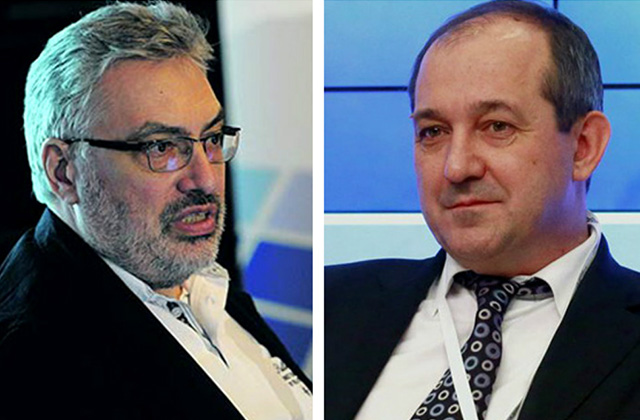How does Russia through Armenia Convince Azerbaijan to Pay?

Azerbaijan-Russia negotiations on high level launched from February are still in process. Putin-Aliyev telephone talks on February 25 and 27 were followed by visits of Russia’s officials to Azerbaijan. Recently “Kommersant” (Moscow) reported it was conditioned by issues emerged as a result of Russia-Azerbaijan weaponry deal. According to the Russian magazine, due to fall in price for oil in international market, Azerbaijan isn’t able to pay for weaponry and equipment purchase from Russia, on which Dmitri Rogozin, RF Deputy Prime Minister, visited Azerbaijan to negotiate with the president Ilham Aliyev.
According to “Kommersant” main issues, emerged between Azerbaijan and Russia, refer implementation of accords signed years before. “The main issue is as follows: Azerbaijan has no money,” cites one of the interviewees, claiming that, “Equipment ordered by Baku has been prepared and delivered, however, it stands still in the port, waiting for settlement of the issue.”
“Azerbaijan is a big player in the weaponry market and Russia doesn’t intend to lose it. In the period of 2010-2014 Baku signed accords with Moscow on purchase of two divisions of C-300 missile installations, Top-2 missile systems, about hundred military and transporting helicopters, hundreds of tanks and other types of weaponry. Total volume reached USD 4 billion, and upon certain sources, most of the contracts have been implemented,” the magazine reports. It also points at Azerbaijan’s response on weaponry loan allocated to Armenia by Russia (USD 200 million), in connection of which Baku sent a protest note to Moscow.
Information on negotiations held by Rogozin wasn’t elucidated. His visit was followed by Grigori Karasin’s, RF Deputy MFA, visit to Baku; the agenda covered issues on perspectives for bilateral contact at different levels, the South Caucasus issues. However, this visit gave ground to a range of analysts anticipating that Rogozin failed to come to an agreement, thus Karasin was sent to Baku.
Noteworthy enough, before these negotiations Russia published details of USD 200 million loan agreement, signed between Russia and Armenia, as well as the list of weaponry and military equipment to be purchased within it. Note, it refers “Smerch” multiple rocket system, “Igla-S” air defense missile systems, “Avtobaza-M” radio intelligence complexes, TOS systems, 9M113M missiles, RPG-26 grenade launchers, “Tiger” armored vehicles, SPD 7,62mm sharpshooter, and other communication and engineering equipment.
Russian military expert Pavel Felgenhauer, in an interview with 168.am said Russia’s economic and geo-political situation oblige pay much more attention to weaponry business, which, is both a financial and political lever for the Kremlin.
“It isn’t news that selling of weaponry to NKR conflicting parties is a business for Russia. Nothing has changed here: Russia sells military equipment both to Armenia and Azerbaijan, thus keeping military balance and gaining money at the same time,” Felgenhauer said. According to the latter, it isn’t excluded that publication of weaponry provided to Armenia, wasn’t accidental at all. “Maybe, by that Russia wanted to send a message to Azerbaijan to hurry in paying, as Armenia already has such powerful weaponry under possession, as the published list includes rather influential and contemporary weaponry, from which Azerbaijan should beware of.”
Everything is clear here: Russia’s strategy in Transcaucasia didn’t change throughout recent years, and international relations hint that in the coming years they won’t change either. By this policy Russia attempts to keep its position in Transcaucasia, where Azerbaijan is of crucial importance for Russia, and not paying for the weaponry is an issue of serious concern for Russia, thus Russian party did its best to give quick solution to this issue,” Pavel Felgenhauer claimed. In his conviction, Russian party will succeed to solve the issue.
Vladimir Yevseev, Head of Caucasus Department of the CIS Institute, military expert, in an interview with 168.am once again stressed his disposition on Armenia-Russia and Azerbaijan-Russia weaponry deals, stating, by selling weaponry to Azerbaijan, Russia doesn’t violate its allied responsibilities, moreover, it makes Armenia’s enemy more predictable. Russian analyst doubted—maybe there is no need seeking for a liaison between these two developments. As for the issue that Baku doesn’t have financial means to pay for Russian weaponry, in his opinion, in Armenia they should understand, the less weaponry Azerbaijan will be able to purchase, the better Armenia’s condition will be in NKR conflict.
“Russia is ready to implement its allied liabilities before Armenia, what it currently does, and if, against this background, Azerbaijan reduces purchase of military equipment, restoration of balance between NKR conflict becomes much easier for us. As a military expert, I highlight military balance especially in such types like TOS-1 “Solntseplyuk” heavy flame thrower system, “Uragan” system. They are systems, in case of which balance should be implemented,” Yevseev mentioned.
To our claim, for which purpose secret military information was elucidated, endangering security of Russia’s military ally, Yevseev replied, that systems mentioned by him, as well as other powerful weaponry are included in the published list.
“That is, Armenia will obtain these types, which will solve a range of security issues of Armenia in NKR conflict, however, on the other hand, Russia attempts to restore power balance from the perspective of that weaponry, and the fact that Azerbaijan doesn’t purchase military equipment from Russia, means, this balance should be soon restored,” Yevseev said.
By Araks Martirosyan

























